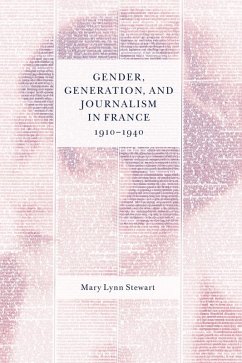In the late nineteenth century, the first wave of female journalists began writing in the French daily press. Yet, while they undeniably opened doors for the next generations of educated women, sexist hiring practices, assumptions about women's aptitudes as reporters, and more subtle gender biases continued to saturate the industry in the decades that followed. Gender, Generation, and Journalism in France, 1910-1940 investigates the careers and written work of ten women who regularly reported in the national, Paris-based dailies. Addressing the role of mentorship, family connections, gendered behaviours, reporting styles, and subject matter, Mary Lynn Stewart debunks lingering essentialist notions about women's entry into journalism. She shows that struggling newspapers, attempting to reverse declining circulation, hired women to cover subjects that expanded to include international relations, colonial conflicts, trials, local politics, and social problems. Through content analysis, deixis, and systematic comparisons of several women and men reporting on the same or different events, she further queries claims about a feminine style, finding more similarities than differences between masculine and feminine reporting. Documenting the persistence of gender discrimination in the hiring, assigning, and assessment of women reporters in the French daily press, Gender, Generation, and Journalism in France, 1910-1940 demonstrates that, through the support of their female colleagues, women managed to succeed despite a variety of challenges.
Dieser Download kann aus rechtlichen Gründen nur mit Rechnungsadresse in A, B, BG, CY, CZ, D, DK, EW, E, FIN, F, GR, HR, H, IRL, I, LT, L, LR, M, NL, PL, P, R, S, SLO, SK ausgeliefert werden.
Hinweis: Dieser Artikel kann nur an eine deutsche Lieferadresse ausgeliefert werden.









